|
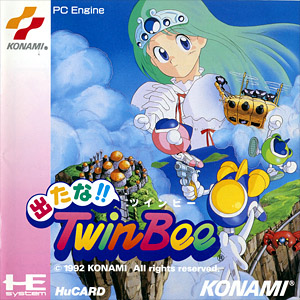
|

|
|
出たな!ツインビー
©1992 Konami
Release : 1992-02-28 (¥6800)
HuCard (4 Mbits) KM92004
Shooter / Vertical
|
Here is the PC Engine port of Konami's very colorful and
cute vertical shooter Detana!! Twin Bee originally released in the
arcades in 1991. In a last-ditch effort, princess Melora, queen of planet
Meru, sends a SOS distress signal - the Eva (aka Eve) aliens
have attacked her home planet and armies of fearsome monsters have invaded the land
and have wreaked chaos. Two elite pilots, the young Light and his cousin
Pastel, decide to swoop to her rescue. They operate Twinbee and
Winbee, two cute and equally powerful flying war machines capable of
shooting everything in sight with their awesome ranged attacks. The aircrafts
are also equipped with tiny arms allowing them to drop bombs and hit enemies
on the ground. But these arms are not immune to enemy fire and losing them
prevents the player to use ground attacks (thankfully, a repair-ship soon
appears after both arms have been shot down in order to remediate the situation).
Additionally, weapons can be upgraded by shooting at floating clouds - they
release colored bells which, if shot again, change color and give up various
special powers, such as Speed-ups, Force Fields, Wide Shots,
Flying Options and so forth... Additionally, the player can also charge
up a powerful fire-blast and inflict serious damage to any enemies
unfortunate enough to lie in its path. Finally, Gwinbee, the green
TwinBee, can help Light and Pastel on their amazing
journey... well, that's as long as they can find him! Detana!! Twinbee
consists of seven stages and also features a two simultaneous player mode
(where both players can join forces and release special attacks!).
|
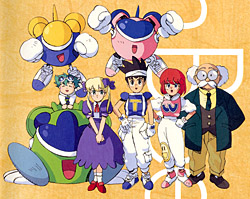 Twinbee is a very popular series of games by Konami (Well, at least for Japan that is)
that started in the arcades back in 1985. The first Twinbee was a vertical shooter somewhat
inspired by other great masterpieces of the time such as Namco's Xevious. However,
Konami added its own flair and set of innovations to the mix - cute flying characters with
little arms, flying bells power-up system and the option for two players to unite and fire
powerful attacks. This first opus was a success and was converted to a couple of Japanese home
systems at the time - Famicom (1986),
MSX (1986) and the Game Boy (1990).
Moero! Twinbee: Cinnamon Hakasei wo Sukue followed in 1988 - this
sequel was exclusively released for the Famicom system (it was released in the US
though and renamed 'Stinger' for the occasion). It was the first (and only) Twin Bee
game to feature horizontal-scrolling levels (well, Twinbee Rainbow Bell Adventure released
for the Super Famicom in 1994 did as well, but it was platform game and not a shooter).
Twinbee 3: Poko Poko Daimaō folllowed in 1989, and exclusively for the Famicom system
(no western release). But the true sequel to the original arcade game was
Twinbee is a very popular series of games by Konami (Well, at least for Japan that is)
that started in the arcades back in 1985. The first Twinbee was a vertical shooter somewhat
inspired by other great masterpieces of the time such as Namco's Xevious. However,
Konami added its own flair and set of innovations to the mix - cute flying characters with
little arms, flying bells power-up system and the option for two players to unite and fire
powerful attacks. This first opus was a success and was converted to a couple of Japanese home
systems at the time - Famicom (1986),
MSX (1986) and the Game Boy (1990).
Moero! Twinbee: Cinnamon Hakasei wo Sukue followed in 1988 - this
sequel was exclusively released for the Famicom system (it was released in the US
though and renamed 'Stinger' for the occasion). It was the first (and only) Twin Bee
game to feature horizontal-scrolling levels (well, Twinbee Rainbow Bell Adventure released
for the Super Famicom in 1994 did as well, but it was platform game and not a shooter).
Twinbee 3: Poko Poko Daimaō folllowed in 1989, and exclusively for the Famicom system
(no western release). But the true sequel to the original arcade game was
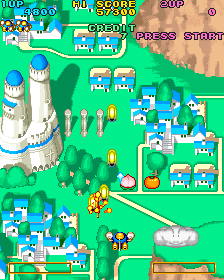 Detana!! Twinbee (aka 'Bells & Whistles') released in 1991 - a colorful and
fantastic upgrade, and definitively the most popular opus in the series (picture on the right). The game was a
commercial success in Japan, and was ported to several home systems, such as the
Sharp X68000 (1991), PC Engine (1992) and was later included in the
Detana TwinBee Yahoo! Deluxe Pack released in 1995 for the Playstation
and Saturn. Pop'n Twinbee,
released for the Super Famicom in 1993,
is a wonderful sequel to Detana!! Twinbee and introduced the series to Europe for
the first time (this is why Twinbee is often referenced as 'Pop'n Twinbee' there),
but alas, no US release. Then, the same year, the Twinbees used their legs for a change
and became the heroes of a platform game for the
Super Famicom - Twinbee Rainbow Bell Adventure was exclusively released for
Nintendo's system, and was also only localized in Europe. Another
interesting spin-off was TwinBee Taisen Puzzle Dama, released for the
Playstation in 1994 and based on a matching puzzle series by Konami,
but starring Twinbee characters. The real arcade sequel to Detana!! Twinbee
was released in 1995 - TwinBee Yahho! Fushigi no Kuni de Daiabare!! apparently
commemorated the 10th anniversary of Konami's series (the year 2005 was not so lucky).
However, it was also its swan song and is, to date, the last Twinbee shooter
ever released by Konami. The gorgeous game was ported to the Playstation and
Saturn in 1995, and was later included in the TwinBee Portable
compilation (2007). The Twinbee game that followed was curiouly a Role Playing
Game, and was probably created for fans of the Twinbee Paradise anime and radio
drama shows (please read the relevant section below). Twinbee RPG was released
for the Playstation in 1998 and was the final instalment of the series
(if we exclude compilations). Interestingly, another RPG called TwinBee Miracle
was announced around 1995 and was in development for the Playstation but was
eventually cancelled (the game was entirely in 2D and was maybe canceled in favor
of the fully 3D TwinBee RPG). After the release of Twinbee RPG, the
franchise went quiet. Despite a number of compilations
(such as TwinBee Portable (PSP, 2007)), reeditions (such as
Twinbee Famicom Mini Series (Gameboy Advance, 2004) or
3D Classics TwinBee (3DS, 2011)) or phone games
(Line Go Go! TwinBee, 2013) the franchise has been sadly dormant...
Detana!! Twinbee (aka 'Bells & Whistles') released in 1991 - a colorful and
fantastic upgrade, and definitively the most popular opus in the series (picture on the right). The game was a
commercial success in Japan, and was ported to several home systems, such as the
Sharp X68000 (1991), PC Engine (1992) and was later included in the
Detana TwinBee Yahoo! Deluxe Pack released in 1995 for the Playstation
and Saturn. Pop'n Twinbee,
released for the Super Famicom in 1993,
is a wonderful sequel to Detana!! Twinbee and introduced the series to Europe for
the first time (this is why Twinbee is often referenced as 'Pop'n Twinbee' there),
but alas, no US release. Then, the same year, the Twinbees used their legs for a change
and became the heroes of a platform game for the
Super Famicom - Twinbee Rainbow Bell Adventure was exclusively released for
Nintendo's system, and was also only localized in Europe. Another
interesting spin-off was TwinBee Taisen Puzzle Dama, released for the
Playstation in 1994 and based on a matching puzzle series by Konami,
but starring Twinbee characters. The real arcade sequel to Detana!! Twinbee
was released in 1995 - TwinBee Yahho! Fushigi no Kuni de Daiabare!! apparently
commemorated the 10th anniversary of Konami's series (the year 2005 was not so lucky).
However, it was also its swan song and is, to date, the last Twinbee shooter
ever released by Konami. The gorgeous game was ported to the Playstation and
Saturn in 1995, and was later included in the TwinBee Portable
compilation (2007). The Twinbee game that followed was curiouly a Role Playing
Game, and was probably created for fans of the Twinbee Paradise anime and radio
drama shows (please read the relevant section below). Twinbee RPG was released
for the Playstation in 1998 and was the final instalment of the series
(if we exclude compilations). Interestingly, another RPG called TwinBee Miracle
was announced around 1995 and was in development for the Playstation but was
eventually cancelled (the game was entirely in 2D and was maybe canceled in favor
of the fully 3D TwinBee RPG). After the release of Twinbee RPG, the
franchise went quiet. Despite a number of compilations
(such as TwinBee Portable (PSP, 2007)), reeditions (such as
Twinbee Famicom Mini Series (Gameboy Advance, 2004) or
3D Classics TwinBee (3DS, 2011)) or phone games
(Line Go Go! TwinBee, 2013) the franchise has been sadly dormant...
|
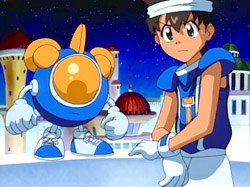 A radio drama show called TwinBee Paradise (somewhat based on Pop'n Twinbee)
was aired on Nippon Cultural Broadcasting in Japan from 1993 to 1997. Interestingly,
the Twinbee pilots weren't given a poper name in Detana!! Twinbee - although
the first Twinbee arcade game called the two pilots 'Annamon' and
'Donnamon' (the two apprentice boys of Dr. Cinnamon), Detana!! Twinbee
kept their identity secret. That was until the TwinBee Paradise show started and
finally introduced them as Light (pilot of Twinbee), his cousin Pastel
(pilot of Winbee) and her baby brother Mint (pilot of Gwinbee).
Apparently, the radio drama became very popular in Japan, and several animes
followed - TwinBee: WinBee no 1/8 Panikku (released in 1994 as a tie-in to the
Super Famicom/SNES game TwinBee Rainbow Bell Adventure),
Tulip Kaigan Monogatari (1998) and a three episode OVA called TwinBee Paradise
and released from 1998 to 1999 (picture on the left). Additionally, a series of three mangas based on
Detana!! Twinbee was produced in Japan between 1994 and 1996.
A radio drama show called TwinBee Paradise (somewhat based on Pop'n Twinbee)
was aired on Nippon Cultural Broadcasting in Japan from 1993 to 1997. Interestingly,
the Twinbee pilots weren't given a poper name in Detana!! Twinbee - although
the first Twinbee arcade game called the two pilots 'Annamon' and
'Donnamon' (the two apprentice boys of Dr. Cinnamon), Detana!! Twinbee
kept their identity secret. That was until the TwinBee Paradise show started and
finally introduced them as Light (pilot of Twinbee), his cousin Pastel
(pilot of Winbee) and her baby brother Mint (pilot of Gwinbee).
Apparently, the radio drama became very popular in Japan, and several animes
followed - TwinBee: WinBee no 1/8 Panikku (released in 1994 as a tie-in to the
Super Famicom/SNES game TwinBee Rainbow Bell Adventure),
Tulip Kaigan Monogatari (1998) and a three episode OVA called TwinBee Paradise
and released from 1998 to 1999 (picture on the left). Additionally, a series of three mangas based on
Detana!! Twinbee was produced in Japan between 1994 and 1996.
|
|
Like many Konami characters and long runnning series in the 1980s/1990s,
Twinbee made numerous cameos or guest appearances in other games. The most
popular is certainly the Parodius series which featured Twinbee as a
playable ship in the orginal arcade game (1992), as well as
Gokujō Parodius (1994) and Jikkyō Oshaberi Parodius (1996).
Interestingly, although none of the Twinbee ships are featured in
Sexy Parodius (1996), Konami nevertheless included the
Shooting Star, a fighter that originally appeared in
TwinBee Yahho! Fushigi no Kuni de Daiabare!!. Twinbee also
made several guest appearances in
Konami Wai Wai World (Famicom, 1988),
Wai Wai World 2 SOS!! Paseri Jō (Famicom, 1991) or
DreamMix TV World Fighters (GameCube, 2003) to only name a few.
Numerous Twinbee characters also appeared in various Konami
titles - for instance, Pastel made a cameo appearance in
Battle Tryst (Arcade, 1998),
Konami Krazy Racing (Game Boy Advance, 2001) and
Otomedius Excellent (Xbox 360,2011).
|
Game Staff (Copied from the end credits) :
|
STAFF
Producer
K. Kitaue
Director
Y. Yamada
|
|
Sound
Metal Yuhki
Kiyoshi Mu
Special Thanks
M. Kurono
M. Saitou
S. Hayashi
|
|
Sound Designer
H. Muraoka
Producer
A. Nagata
|
|
Arcade Team
Giken No Minasan
©1992 Konami
All Rights Reserved
|
|
O
M
A
K
E
|
|
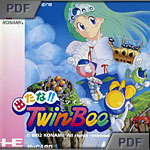
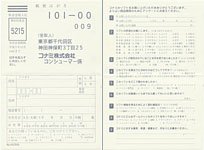
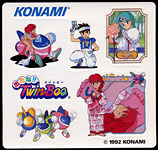
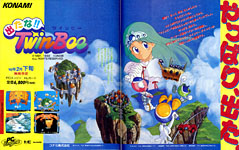
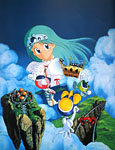
|
|
|
Click on picture to enlarge |
S
E
C
R
E
T
S
|
|
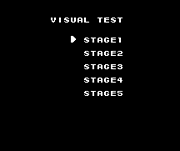 Note that you will need a 5 players multipad in order to enter the following codes.
Note that you will need a 5 players multipad in order to enter the following codes.
Arcade mode:
At the title screen, press I, II, Right, Left,
Right, Left, Down, Down, Up and Up on the third controller.
Then go to the option menu, a new option called HMode should have appeared,
switch is to VMode to activate the arcade screen format.
Play all between-level animations:
At the title screen, press Up, I, Right, II,
Down, I, Left, II, Up and Select
on the fifth controller. This should activate the Visual Test screen (picture on the right).
|
|
|
|
LK

|
|
Add your Pov here !
|
P
O
V
s
|
|
Konami has blessed us with amazing shooters - Gradius,
Salamander or the more obscure (at least in the west) Parodius
and Twinbee series. I have personally always loved Twinbee and
Detana!! Twinbee is a terrific game. It is probably the better known
in the series, and one would think that the cute graphics would indicate that
it was aimed to
a young audience - but soon the game shows its real teeth and hits you with
some razor-edged difficulty spikes (but the game is overall not that hard,
especially by Konami's standards).
This PC Engine conversion is
awesome - lovely and endearing graphics, great soundtrack, and, as always
with Konami, it features a superb gameplay. Granted the game
doesn't look as polished and
detailed as the arcade, but Konami did an excellent job with this
conversion. All in all, Detana!! Twinbee is truly wonderful and
shouldn't be missed (especially if you are a fan of what many
call today the "cute'em up" sub-genre).
|
|
|
|